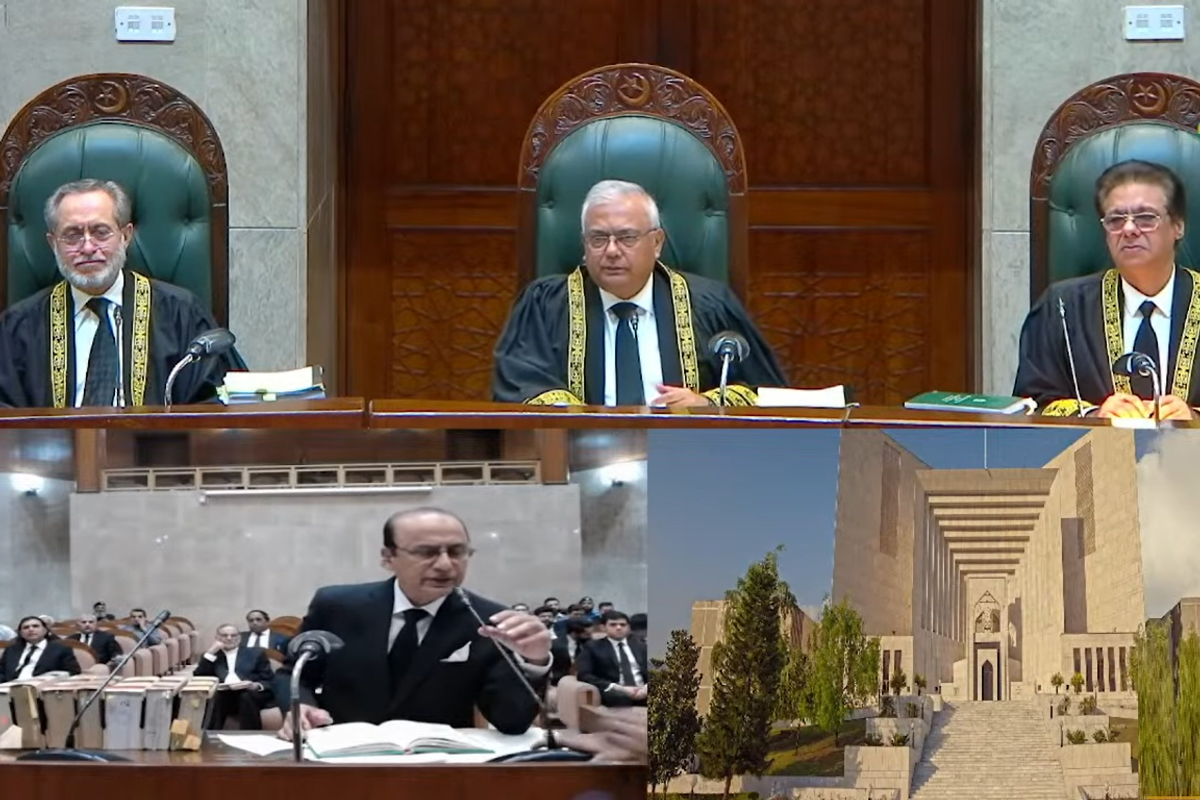Pakistan’s top court seeks constitutional way forward as 26th Amendment hearing continues
Judges urged petitioners to suggest a legal path balancing constitutional supremacy with amendment’s intent
Ali Hamza
Correspondent
Ali; a journalist with 3 years of experience, working in Newspaper. Worked in Field, covered Big Legal Constitutional and Political Events in Pakistan since 2022. Graduate of DePaul University, Chicago.

A lawyer presents his arguments before the Supreme Court bench on Tuesday.
Screengrab
Pakistan’s Supreme Court asked lawyers on Tuesday to propose a constitutional way forward as hearings on the 26th constitutional amendment entered their third week, with judges expressing visible frustration over what they called “untruths” being repeated in court.
“Look at our patience - we are continuously sitting here listening to untruths,” remarked Justice Aminuddin Khan, who heads the eight-member bench, as the court examined whether the amendment establishing a permanent constitutional bench had altered the Supreme Court’s original jurisdiction.
The ongoing hearings, seen as a key test of judicial independence in Pakistan, began earlier this month. So far, nearly a dozen lawyers including Akram Sheikh, Shabbir Raza Rizvi, Abid Zuberi, and Dr. Adnan Khan have argued their cases, while Khawaja Ahmad Hasan, representing former Chief Justice Jawwad S. Khawaja, is scheduled to argue next.
The bench also includes Justices Jamal Khan Mandokhail, Muhammad Ali Mazhar, Ayesha Malik, Hassan Azhar Rizvi, Musarrat Hilali, Naeem Akhtar Afghan, and Shahid Bilal.
The petitions challenge the legality of the 26th Amendment, which created a permanent “constitutional bench” to interpret the Constitution - a reform critics say curtails the chief justice’s powers and weakens judicial independence.
Passed by parliament and signed into law on October 21, 2024, the amendment also introduced a parliamentary mechanism for selecting the Chief Justice and set a three-year fixed term for the office. Opposition parties and legal experts have sharply criticized the move, calling it a threat to the judiciary’s autonomy.
Since its enactment, the amendment has faced multiple constitutional challenges in the Supreme Court and provincial high courts. Political parties, bar associations, and civil society groups — including the Pakistan Tehreek-e-Insaf (PTI) — have argued that it violates the Constitution’s basic structure. Hearings began in late 2024 and resumed two weeks ago after a brief pause.
Inside the courtroom today
During Tuesday’s proceedings, judges pressed petitioners to propose a legal route that could preserve both constitutional supremacy and the amendment’s intent.
“Show us a way where the amendment remains valid but not unconstitutional,” Justice Musarrat Hilali said.
Advocate Shabbir Raza Rizvi maintained that the newly inserted Article 191-A should not be read in isolation, insisting that it does not remove the Supreme Court’s powers under Article 184(3). However, Justice Muhammad Ali Mazhar countered that the provision “clearly states” those powers now belong to the constitutional bench.
Justice Jamal Khan Mandokhail questioned whether the bench and the Supreme Court could legally be considered separate entities. “If we accept that they are separate,” he said, “then the law only gives powers to the Supreme Court, not to the bench.”
The hearing will continue on Wednesday, when Khawaja Ahmad Hasan begins arguments on behalf of former chief justice Jawwad S. Khawaja, as the court seeks to chart a constitutional course through one of Pakistan’s most divisive legal debates in years.










Comments
See what people are discussing